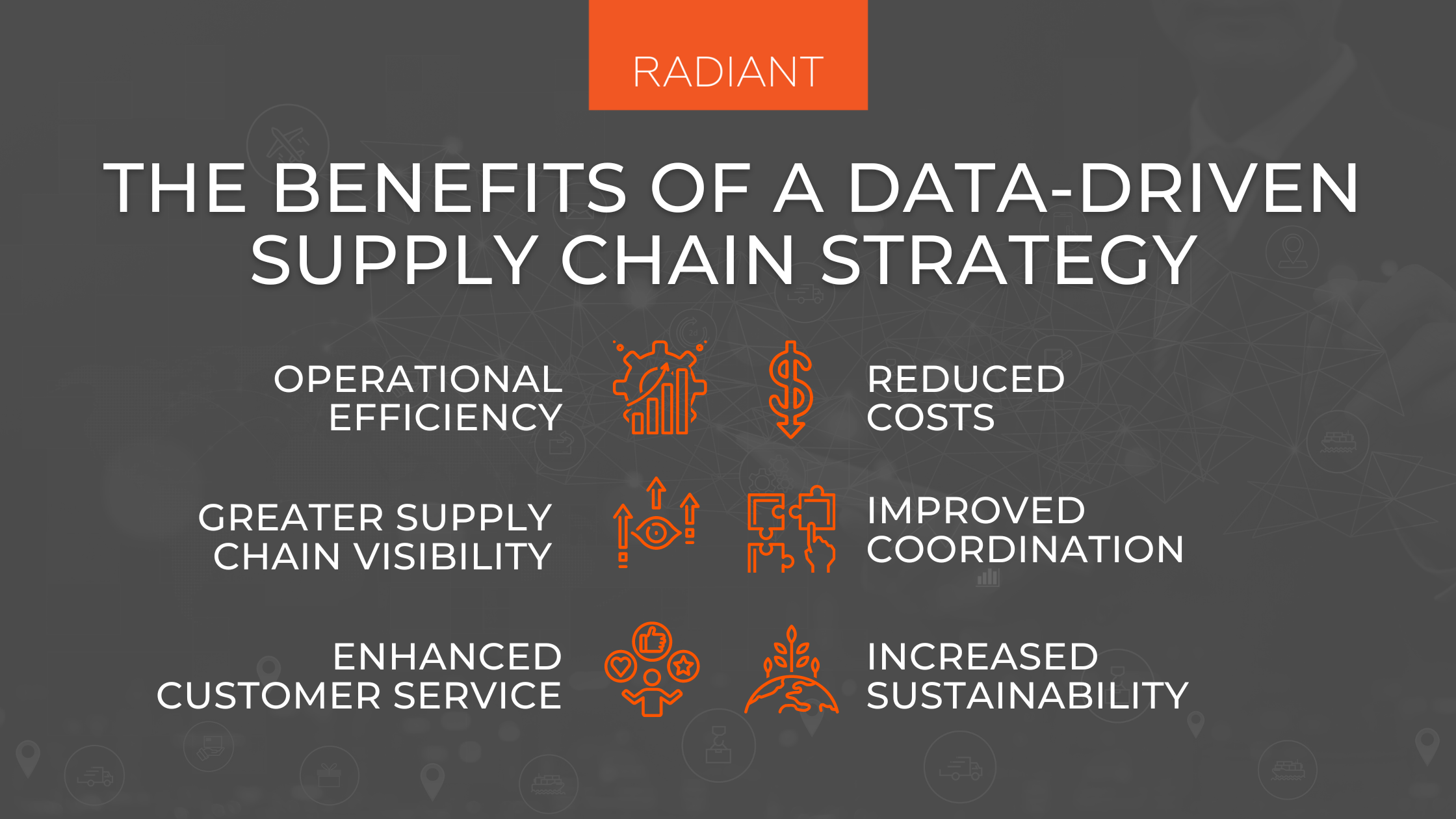Are you looking to streamline your supply chain operations and improve asset tracking visibility this year?
In today’s highly competitive market, data-driven strategies are a key factor in the success of any business. By transitioning from manual processes and siloed approaches to automated systems and unified architectures leveraging big data, you can gain valuable insights into inventory management, forecasting accuracy, cost optimization, and efficiency.
With the right tools in place, a data-driven supply chain provides measurable benefits that ultimately lead to increased ROI.
Read on to learn more about how redefining your approach with an updated and data-driven supply chain management strategy will help facilitate sustainable growth for your organization in the new year and beyond.
What Is a Supply Chain Strategy?
Developing a supply chain strategy is essential for any successful business. It involves looking at all areas of the supply chain infrastructure, including procurement, production, distribution, and returns.
To create an effective business strategy, it is necessary to draw from an analysis of the internal and external environment. This includes analyzing suppliers and customers, understanding the delivery landscape, and anticipating potential risks or opportunities.
By having a comprehensive supply chain strategy, companies can ensure that resources are used effectively and improve their competitive advantage.
What Is a Data-Driven Supply Chain Strategy?
A data-driven supply chain strategy is optimizing the flow of data within a company’s supply chain to produce faster, more cost-effective results for businesses.
Based on data about customer demand, production resources, and transportation models, data-driven strategies identify areas where greater efficiencies can be gained by streamlining processes.
An effective data-driven supply chain strategy increases both product quality and customer satisfaction by leveraging data to identify inefficiencies that may occur in different parts of the supply chain process.
Additionally, data-driven supply chains are increasingly important for today’s businesses as they strive for competitive advantages in ever-changing markets.
By enabling businesses to analyze data quickly and adjust their operations accordingly with minimal disruption, data-driven supply chains help to ensure maximum profitability and long-term sustainability.
How Do Data-Driven Supply Chains Work?
Data-driven supply chains use data and analytics to create an efficient and cost effective logistics strategy.
Data collection is key in data-driven supply chains, which can involve IoT sensors and technology that measure asset data like weight and dimensions, temperature levels during transportation, or the real-time location of shipments at certain points in the supply chain.
This data is then analyzed to identify trends and causes of delays, which allows companies to adjust protocols quickly and effectively.
By leveraging data-informed intelligence, data-driven supply chains can optimize material flow while simultaneously reducing lead time and inventory costs – all critical ingredients for a successful supply chain strategy.
The Benefits of Adopting a Data-Driven Supply Chain Strategy
When businesses invest in data-driven supply chain strategies, they engage in a strategic decision that can yield tangible benefits, including:

1. Operational Efficiency: A data-driven supply chain strategy can help to increase the efficiency of your supply chain by reducing waste and improving coordination between different parts of the supply chain.
2. Reduced Costs: A data-driven supply chain strategy can also help to reduce the costs associated with your supply chain by increasing visibility into the supply chain and identifying opportunities for cost savings.
3. Greater Supply Chain Visibility: One of the key benefits of a data-driven supply chain strategy is that it can help to increase visibility into the supply chain, which can be used to identify issues and optimize performance.
4. Improved Coordination: Another benefit of a data-driven supply chain strategy is that it can help to improve coordination between different parts of the supply chain, which can lead to improved efficiencies and reduced costs.
5. Enhanced Customer Service: A data-driven supply chain strategy can also help to enhance customer service by providing visibility into customer orders and shipments, and by helping to ensure that customer orders are fulfilled on time and in full.
6. Increased Sustainability: Finally, a data-driven supply chain strategy can help to increase the sustainability of your supply chain by reducing emissions, waste, and water usage.
As such, leveraging data-driven insights help empower businesses to build a more resilient supply chain while maintaining their competitive edge in the modern markets.
The Challenges of Implementing a Data-Driven Supply Chain Strategy
Implementing a data-driven supply chain strategy can be an exciting journey for organizations, but it undoubtedly poses many challenges.
One of the main obstacles is a need for more trust in the data used to inform decisions – with precise, reliable data, it can be easier to make confident decisions or even define the direction of a supply chain endeavor. Establishing this trust requires finding the right sources and ensuring their accuracy using auditing and reporting practices.
Additionally, overcoming technological barriers is essential since gathering, storing, and analyzing large amounts of data requires comprehensive software systems that require significant investments of both time and money.
Finally, there’s human error: since many supply chain processes must often be manually modified by personnel on the ground, ensuring accuracy can sometimes be complicated.
However, with adequate resources, concerted effort, and vigilance however, implementing a successful data-driven supply chain strategy is possible.
How to Ensure the Successful Implementation of a Data-Driven Supply Chain Strategy
A truly successful data-driven supply chain strategy involves leveraging the right technology and analytics.
Having an asset tracking and management solution in place can be key to this, as it allows organizations to collect and monitor real-time data on their resources, analyze performance, predict future events, and optimize operations accordingly.
However, obtaining the service of an experienced provider is a must for efficient setup, reliable operation, and maintenance, as well as continual access to any needed support – especially when changes occur in fast-moving markets.
Without an experienced provider to turn to that has deep expertise in asset tracking and management solutions – including required knowledge of related software systems, scalability options, and global compliance requirements – organizations may struggle with keeping consistent performance levels over time or adapting quickly enough to changing markets.
In short, having a trusted partner can make all the difference when ensuring the success of your data-driven supply chain strategy.
Implement A Data-Driven Approach To Supply Chain Management With Radiant
To keep up with the competition and excel in the modern business world, it is essential to have a strong supply chain management strategy. A data-driven supply chain strategy is one of the best ways to ensure success.
With a data-driven approach, your company can make more informed decisions, improve communication and collaboration, reduce costs, and improve customer satisfaction.
Implementing a data-driven supply chain strategy can be challenging, but with the right tools and partners in place, it can be successfully done.
Radiant provides IoT solutions that can help you implement a data-driven approach to supply chain management. Request your demo below to learn more about how we can help you take your business to the next level.
Last Updated on January 5, 2023 by Radiant

